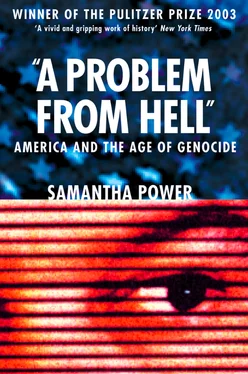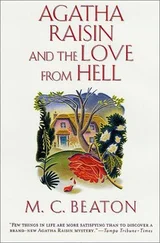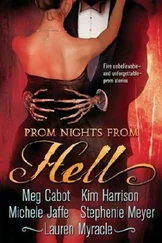Forbidden to move around the city, the remaining foreigners huddled at the French embassy, awaiting KR clearance to leave. 43The best early intelligence on the nature of the new KR regime consisted of mental snapshots that these reporters, aid workers, and diplomats had gathered before they were confined at the embassy. Most had seen the fearsome KR cadres driving trembling Cambodians out of town, but they had not witnessed killings. “There were no massacres committed in front of us,” recalls Schanberg, who was very nearly executed, along with his colleagues Rockoff and Swain, while snooping around a hospital on the day of the KR victory. “We did see these people from another planet.You had the feeling that if you did something they didn’t like they would shoot you. But we had no awareness of what was to come.”
On May 6 a final caravan of trucks carrying Schanberg and the last Western witnesses to KR rule left Cambodia. The evacuees peered out from behind their blindfolds on the stifling hot journey. The KR had been in charge less than three weeks, but the signs of what we would later understand to be the beginning of genocide were already apparent. All of Cambodia’s major towns had already been emptied of their inhabitants. The rice paddies, too, were deserted. The charred remains of cars lay gathered in heaps. Saffron-robed monks had been put to work in the fields. Decomposed bodies lay by the side of the road, shot or beaten to death. KR soldiers could be spotted with their heads bowed for their morning “thought sessions.” 44The overriding impression of those who drove through a country that had bustled with life just weeks before was that the Cambodian people had disappeared.
Once the final convoy of foreigners had been safely evacuated, the departed journalists published stark front-page accounts. They acknowledged that the situation unfolding was far more dire than they had expected. In a cover story for the New York Times, Schanberg wrote: “Everyone—Cambodians and foreigners alike—looked ahead with hopeful relief to the collapse of the city… All of us were wrong.… That view of the future of Cambodia—as a possibly flexible place even under Communism, where changes would not be extreme and ordinary folk would be left alone—turned out to be a myth.” 45Schanberg even quoted one unnamed Western official who had observed the merciless exodus and exclaimed, “They are crazy! This is pure and simple genocide. They will kill more people this way than if there had been hand-to-hand fighting in the city.” 46That same day the Washington Post carried an evacuation story that cited fears of “genocide by natural selection” in which “only the strong will survive the march.” 47
Although Schanberg and others were clearly spooked by their chilling final experiences in Cambodia, they still did not believe that American intelligence would prove right about much. In the same article in which Schanberg admitted he had underestimated the KR’s repressiveness, he noted that official U.S. predictions had been misleading. The U.S. government had said the Communists were poorly trained, Schanberg noted, but the journalists had encountered a well-disciplined, healthy, organized force. The intelligence community had forecast the killing of “as many as 20,000 high officials and intellectuals.” But Schanberg’s limited exposure to the KR left him convinced that violence on that scale would not transpire. He wrote:
There have been unconfirmed reports of executions of senior military and civilian officials, and no one who witnessed the take-over doubts that top people of the old regime will be or have been punished and perhaps killed or that a large number of people will die of the hardships on the march into the countryside. But none of this will apparently bear any resemblance to the mass executions that had been predicted by Westerners. 48
Once the reporters had departed, the last independent sources of information dried up. Nine friendly Communist countries retained embassies in Phnom Penh, but even these personnel were restricted in movement to a street around 200 yards long and accompanied at all times by official KR “minders.” 49For the next three and a half years, the American public would piece together a picture of life behind the Khmer curtain from KR public statements, which were few; from Cambodian radio, which was propaganda; from refugee accounts, which were doubted; and from Western intelligence sources, which were scarce and suspect.
Official U.S. Intelligence, Unofficial Skepticism
When the KR first took power, U.S. officials eagerly disclosed much of what they knew. The Ford administration condemned violent abuses, reminding audiences that its earlier forecasts of a Khmer Rouge bloodbath were being borne out by fact. The day after the fall of Phnom Penh, Kissinger testified on Capitol Hill that the KR would “try to eliminate all potential opponents.” 50In early May 1975, President Ford said he had “hard intelligence,” including Cambodian radio transmissions, that eighty to ninety Cambodian officials and their spouses had been executed. 51He told Time magazine, “They killed the wives, too. They said the wives were just the same as their husbands. This is a horrible thing to report to you, but we are certain that our sources are accurate.” Newsweek quoted a U.S. official saying “thousands have already been executed” and suggested the A Khmer Rouge guerrilla orders store owners to abandon their shops in Phnom Penh on April 17, 1975, the day the city fell into rebel hands. figure could rise to “tens of thousands of Cambodians loyal to the Lon Nol regime.” With intercepts of KR communications in hand, U.S. officials were adamant about the veracity of their intelligence. “I am not dealing in third-hand reports,” one intelligence analyst told Newsweek . “I am telling you what is being said by the Cambodians themselves in their own communications.” 52Syndicated columnists Jack Anderson and Les Whitten, who would regularly relay reports of atrocities over the next several years, published leaked translations of these secret KR radio transmissions in the Washington Post . “Eliminate all high-ranking military officials, government officials,”one order read. “Do this secretly. Also get provincial officers who owe the Communist Party a blood debt.”Another KR unit, relaying orders from the Communist high command, called for the “execution of all military officers from lieutenant to colonel, with their wives and their children.” 53In a press conference on May 13, Kissinger accused the KR of “atrocity of major proportions.” 54President Ford again cited “very factual evidence of the bloodbath that is in the process of taking place.” 55
But the administration had little credibility. Kissinger had bloodied Cambodia and blackened his own reputation with past U.S. policy. Just as critics heard the Ford administration’s earlier predictions of bloodshed as thinly veiled pretexts for supplying the corrupt Lon Nol regime with more U.S. aid, many now assumed that American horror stories were designed to justify the U.S. invasion of Cambodia and Vietnam. Events elsewhere in Southeast Asia were only confirming the unreliability of U.S. government sources. The United States had similarly warned that the fall of Saigon would result in a slaughter, but when the city fell on April 30, 1975, the handover was far milder than expected. The American public had learned to dismiss what it deemed official rumor-mongering and anti-Communist propaganda. It would be two years before most would acknowledge that this time the bloodbath reports were true.
The U.S. government also lost reliable sources inside Cambodia. One of the side effects of the closing of U.S. embassies in times of crisis is that it ravages U.S. intelligence-gathering capabilities. Cambodia was especially cut off because journalists, too, were barred from visiting. Because the perpetrators of genocide are careful to deny observers access to their crime scenes, journalists must rely on the eyewitness or secondhand accounts of refugees who manage to escape. Reporters trained to authenticate their stories by visiting or confirming with multiple sources thus tend initially to shy away from publishing refugee accounts. When they do print them, they routinely add caveats and disclaimers: With almost every condemnation or citation of intelligence that appeared in the press about Cambodia in 1975 and 1976, reporters included reminders that they had only “unconfirmed reports,”“inconclusive accounts,”or “very fragmentary information.” This caution is warranted, but as it had done during the Armenian genocide and the Holocaust, it blurred clarity and tempered conviction. It gave those inclined to look away further excuse for doing so. “We simply don’t know the full story,”readers said. “Until we do, we cannot sensibly draw conclusions.” By waiting for the full story to emerge, however, politicians, journalists, and citizens were guaranteeing they would not get emotionally or politically involved until it was too late.
Читать дальше












